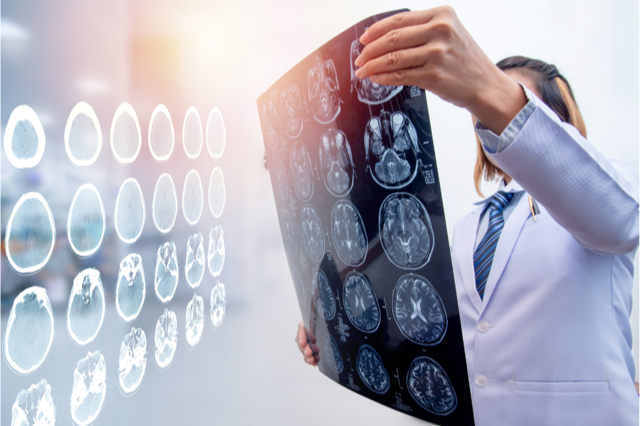Brain injuries can be serious and life-threatening. The brain is responsible for a wide range of functions in our body, such as memory, movement, coordination, speech, hearing, and the function of many of our organs. If someone suffers a traumatic brain injury, he or she may exhibit a variety of physical and psychological symptoms as a result. The individual may experience some symptoms immediately after the injury but may not experience other symptoms until weeks or even months later after the injury has occurred. A brain injury can significantly impair a person's function, even resulting in lifelong disabilities, depending on the severity of the injury.
A brain injury can also be difficult to diagnose, detect and treat. When victims are able to prove that they suffered traumatic brain injuries after an accident they may be entitled to compensation. You should seek immediate medical attention if you or someone you love has suffered a brain injury. You should contact an experienced Florida brain injury lawyer if your injury was caused by someone else's negligence or carelessness. When you suffer a severe injury to your brain, it can affect not only you but the people you care about most as well. Physical, emotional, and financial hardship can be overwhelming for a family.
At DOCS4PI personal injury services, we help victims of traumatic brain injuries get on the road to recovery as soon as possible. We're also able to give you access to the best legal representation in Pinellas.
What Qualifies as a Traumatic Brain Injury?
According to the CDC, a traumatic brain injury (TBI) is defined as "a disturbance in the normal function of the brain." This can be caused by a head injury that penetrates the skin or by a bump, blow, or jolt. Traumatic brain injuries remain a serious public health concern and can occur to anyone at any time. It is therefore important to understand how they occur and what to do if you have the misfortune of suffering from one.
Most Common Causes of Traumatic Brain Injuries in Florida?
It should come as no surprise that trauma to the head is the most common cause of brain injuries. Frequently, brain injuries are caused by a violent blow or impact to the head, but brain injuries can also occur when the brain lacks oxygen or blood or is exposed to dangerous chemicals. Accidents and incidents can cause brain injuries in a variety of ways. Here are some of the most common ones:
Motor Vehicle Accidents
In the United States, car accidents and collisions are among the leading causes of fatal and non-fatal brain injuries. It is possible for drivers, passengers, pedestrians, and other people involved in the accident to suffer severe brain injuries, regardless of the severity of the crash.
Medical Malpractice
Having a doctor makes a mistake while treating a patient or not following standard procedures of care can cause a serious brain injury. Misdiagnoses, surgical and anesthesia errors, medication errors, and birth injuries can all result in brain injuries in the medical setting.
Work Accidents
Traumatic brain injuries resulting from work-related accidents make up approximately 16% of all cases. This includes incidents involving falls, explosions, and other serious incidents.
Slip & Fall Accidents
It is well known that slip and fall accidents are among the leading causes of brain injuries, particularly among the elderly, children, and others who may be at a greater risk of such injuries. There are also many accidents related to slips and falls that occur at construction sites and in other hazardous working environments.
Being Hit by an Object
This is one of the most common causes of brain injuries. Many of these injuries occur at work, but most of them are caused by falling objects in big box stores, supermarkets, and other public establishments.
Physical Violence & Assaults
One of the leading causes of serious brain injuries is violent assault. In the event of a physical attack such as a blow to the head, strangulation, or a punch that causes an individual to fall to the ground, the brain and other parts of the body can suffer serious injury.
Sports Injuries
Individuals who participate in contact and non-contact sports are at risk for concussions and other types of brain injuries. While the media has recently focused on TBIs suffered by National Football League players, all types of athletes, including children, amateurs, and professionals, have a risk of suffering serious brain injuries.
Signs and Symptoms of a Traumatic Brain Injury
Traumatic brain injuries can change a person's life regardless of the type of accident. Their effects are devastating, ranging from recurring headaches to emotional problems. After an accident, you might have thought TBIs are only apparent in people who are unconscious. On the contrary, symptoms can be delayed for weeks or even months.
These are some of the signs of a TBI:
- Persistent headaches
- Trouble concentrating and problem-solving difficulties
- Memory issues
- Trouble reading or writing
- Impaired vision
- Paranoia or hallucinations
- A change in sex drive or sexual function
- Mood swings
- Anxiety or panic attacks
- Irritability
- Difficulty speaking
- Impaired coordination
- Trouble recognizing people or places
- Excessive aggression that seems out of character
- Poor hand-eye coordination
- Feeling dizzy or nauseous
- Ringing in the ears
It usually takes a few months for these symptoms to disappear. Some patients, however, may experience symptoms that last for a long time. The mere presence of these symptoms may be enough to make you miss work, have medical bills, and suffer even though you probably weren't at fault. A personal injury attorney can help if you've suffered an injury in an accident and are seeking compensation. Our medical professionals can refer you to their network of competent personal injury attorneys.
What Should You Do If You Have a Traumatic Brain Injuries Injury?
Traumatic brain injuries require immediate attention. The type, location, and severity of the injury will determine the course of treatment. Rest is the main treatment for a mild injury. Additionally, you can take an over-the-counter pain reliever to relieve headaches and neck pain. If you experience any new or worsening symptoms, you should be closely monitored at home. Consider visiting your physician again for a check-up.
People with moderate to severe TBIs may need rehabilitation. Rehabilitation depends on many factors, including the severity of the injury and what part of the brain has been damaged. An injury that affects the part of your brain responsible for speech, for instance, may require speech therapy. There is also a possibility that you will require physical therapy if the injury affects the part of your brain that controls movement. There are several ways you can get rehabilitation treatment in a hospital, in a skilled nursing facility, at an out-patient clinic, or in your home. The process usually involves a variety of specialists. In order to increase your ability to perform on a daily basis, a therapy or rehabilitation program will aim to help you achieve this goal.
Stabilizing your injury is the first step if you have a moderate or severe injury. Getting oxygen to your brain and body, maintaining blood flow, and regulating your blood pressure are part of this process. These precautions prevent further damage from occurring. You may need medication or surgery. Skull fractures can be repaired, bleeding in the brain can be stopped, blood clots can be removed, or pressure inside the skull can be relieved by a surgeon. This may mean an immediate operation is necessary.
How Do Traumatic Brain Injuries Injury Claims Work in Pinellas?
Taking care of traumatic brain injury patients can be an expensive endeavor. If you have a traumatic brain injury caused by an accident, you can file a personal injury lawsuit against the responsible party with the assistance of an experienced attorney. A personal injury attorney should be contacted as soon as possible after any type of accident. Their legal expertise can help you build a solid case, deal with intimidating insurance companies and win the financial compensation you deserve. This is where negligence plays a critical role. You must prove that the other party caused the accident. The cause of a car accident may be careless driving, dangerous driving, texting and driving, or driving while intoxicated.
Accordingly, if there is a link between the accident and your injuries, you may be entitled to compensation for:
- Medical bills
- Lost wages
- Pain and suffering
- Loss of future earnings
- Loss of ability to function
- Loss of spousal companionship
- Emotional distress
Should You Speak to a Lawyer About a Traumatic Brain Injury?
After suffering a traumatic brain injury, you or a loved one deserve financial compensation for your suffering. If you hire the services of a brain injury attorney, they will be able to assist you with the following:
Getting medical care and finding a doctor
- Engaging with the liable party's insurance company on your behalf
- Collecting evidence in support of your claim
- Filling out the necessary paperwork and filing it
- Obtaining the fairest settlement on your behalf
- Litigation preparation
- Representing you in court if necessary
Need help after sustaining a traumatic brain injury? Contact us at 1-888-DOCS4PI to find the best doctors or personal injury lawyers near you.





